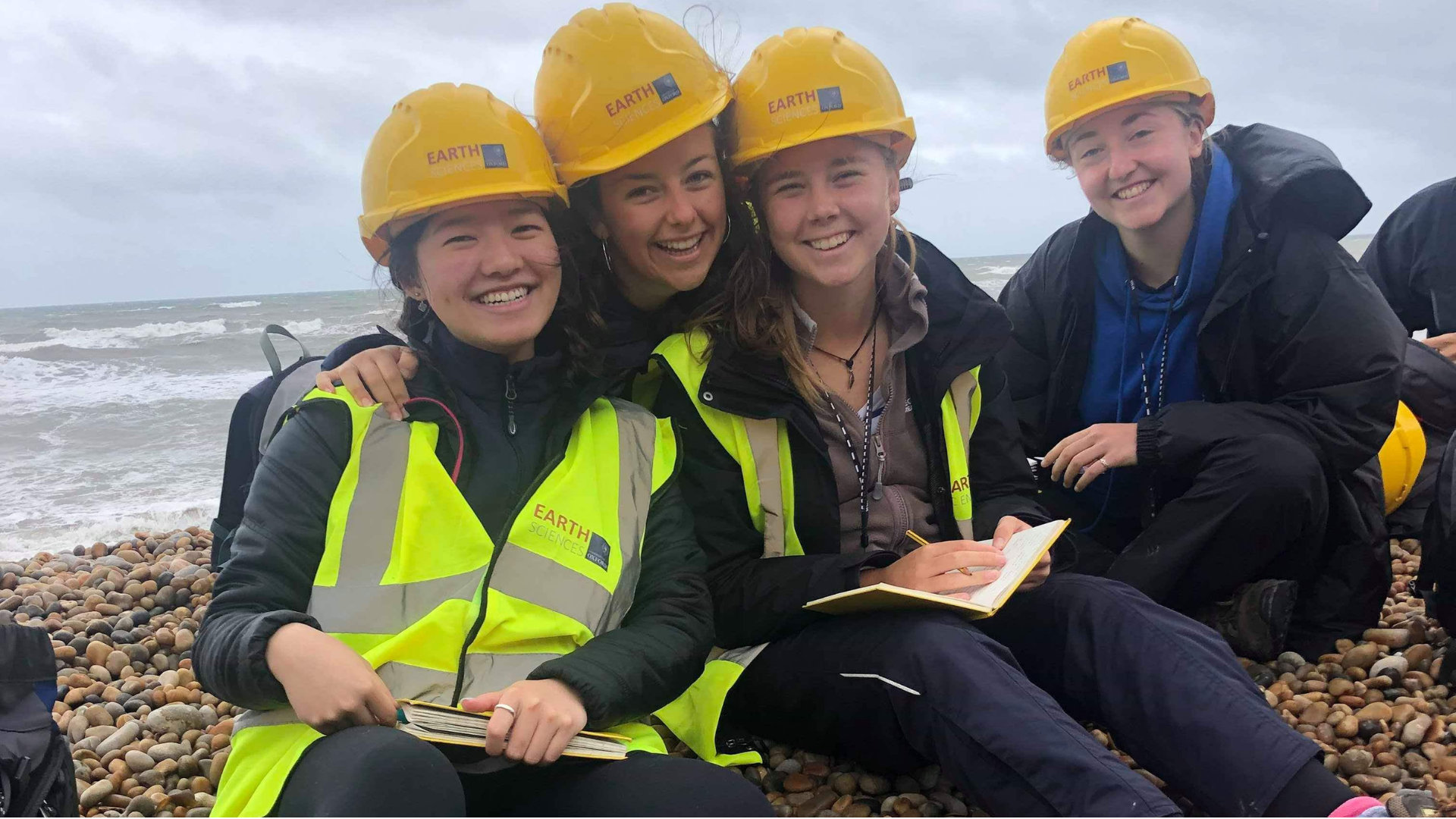I’m a 2nd year Earth Sciences student (second from the left in the picture), and also the first from my immediate and wider family to go to university . I’m from a small market town in the South of England, so Oxford didn’t seem like a reachable goal for me for most of my life. I enjoy being outdoors, whether that’s walking my dog, windsurfing or sunbathing, but I can also binge-watch a whole TV series in one night.
Why did you decide to study your subject at Oxford?
Initially, I was interested in Meteorology. This stemmed from a Geography lesson on clouds, which I enjoyed because I got to observe the environment around me while also making me question how natural processes on Earth worked. In Year 10, I successfully applied for a 3-day course at the University of Reading, studying weather and forecasting, and it soon became my dream to go and study Meteorology at Reading.
When I moved schools for sixth form, I chose to take A Level Geology and my interest in the subject grew. A lot of people imagine the sixth form students who get into Oxbridge as being those who spend most of their free time reading tricky books or cutting-edge articles, but I only really watched TV programmes. My favourites were Blue Planet, Rise of the Continents and Richard Hammond’s Wild Weather.
My physics teacher had done the same course at Reading that I had wanted to do. He was the one who sat me down and said that I should look at other options possibly more suited for my ability. I was pretty shocked by this because even just going to university was a big step for me and my family, but actually going to a more prestigious one? That had never occurred as something that I would be able to do. Alas, I followed his advice and looked into other opportunities.
I wasn’t keen on Oxford at first – I just didn’t think it was the kind of place where I would fit in. People who go to Oxford, or so I thought, were born into lots of money, insanely intelligent (as in the “never making mistakes, could answer every question, always getting nearly 100%”- kind of intelligent) and had connections. I wasn’t really any of those things. I didn’t know if I’d be able to find friends there, let alone fit in or be able to keep up with everyone’s standards.
Then I heard about the UNIQ programme1 (run by Oxford) and with some convincing on my mum’s part, I applied and fulfilled the criteria to get in. There, I met people who were just like me and actually got to feel what the course would be like, and who would be teaching it.
What was your experience of the application process?
I was extremely lucky because UNIQ had given me so much insight into the application process and tips on personal statements and interviews. I do not know how I would have gone about it otherwise, and probably would not be here today.
My sixth form were generally not as supportive towards me as I was not the ‘cleverest’ student. A teacher even told me that it was ‘a stretch too far’ for me to apply to Oxford and ‘not to be disappointed’ with the outcome. This knocked my confidence somewhat.
My parents, though very supportive, were not experienced in the university process and I often found myself explaining parts to them I wanted help on. I did not really know many people who had gone to university, let alone Oxford, that I could ask for help. UNIQ essentially covered where the sixth form fell short for me and I felt so lucky to have all this extra support that other people with my background may not have had. I even felt like I had a level footing with applicants from a more privileged background.
It’s definitely worth having a look online, maybe on websites like The Student Room, at what people suggest to put in personal statements. Ultimately, though, you’re just talking about why the things you see or read are interesting and the thoughts you have on them (don’t go overboard with bragging about the amount you’ve done – it is better to go into detail about one or two things you consider important).
“Earth Sciences is pretty different to most other Oxford subjects”
Earth Sciences is pretty different to most other Oxford subjects, firstly because almost everything is conducted through the department, and secondly as it’s a very small community.
The interviews, unlike all the other subjects, take place outside of college, in the department, as there are only about 130 applicants. This way, you meet not only other applicants at your college but also others applying for your subject.
Everyone has two interviews: the first is with two tutors from the college you’ve applied to, and the second with another two tutors, each from a different college. The interviews are conducted with them presenting a series of Earth Sciences related problems, and then working through them together with you. The idea is for the tutors to see how you approach and think about the problems, involving A Level principles.
For my interview, that meant answering a question based on exponential decay and equations from physics. My first interview went horribly, ending with me asking what I later realised were very silly questions about GCSE level problems (What is a slope? Really?). The second was a lot better (it was with my current college tutor) and I felt a lot more comfortable as they explained parts I didn’t quite get, and worked through the problems involving the mass of oceans and ice on Earth..
In my free time I met up with a few friends from UNIQ who had interviews at the same time as I did or made friends with other applicants in the college JCR – lasting freindships I still have today.
When I received my application decision, I initially got a rejection letter from the college I had applied to, but it also contained an acceptance letter from another college. The best thing about the Earth Sciences application process is that, because it’s all done in the department, every candidate experiences similar interviews and all applicants are then ranked. Based on this, they are distributed to their chosen colleges or moved to another, if there is not enough space. I feel this gives students a better chance of being accepted at a college they haven’t chosen or been interviewed at.
How were the first weeks of your ‘Oxford experience’ like?
After unpacking my room on the first day and seeing my parents driving away, I felt terrified. I’d never been away from home for as long as I was about to be and the whole experience, with completely unknown people, gave me no comfort. It was hard not to get overwhelmed by this, but I pushed through and tried to be as talkative as possible, being open to getting to know every person I spoke with. In fact, no one really seemed unreachable , posh, pretentious and loads of people were just as surprised to be there as I was. You don’t need to worry about looking stupid or asking anyone if they want to do something or go somewhere with you because everyone is worried that no one is going to want to hang around with them.
Freshers’ week is intense, you meet so many new and interesting people and have no idea who you’re going to end up with as your closest friends. First impressions do stick a bit, so be careful about what you get up to, but more than anything, be open to trying a bit of everything. My college parents2 took me out for drinks on my first night and I got introduced to the whole family, which was really nice because I now had friendly faces around college who knew the ropes.
The most daunting part was the fact that at the end of the week, Earth Science students go on a field trip, so not only are you taken away from all these new friends you’ve just made, but then have to make even more in your subject. This was tricky at first, as most of the Earth Scientists like to stick in their college groups, but persevering is key and just being friendly, even if people seem reserved at first. Ultimately, you end up with both a close group of friends in college but also one within Earth Sciences (this takes a bit longer to form than the college one) and you spend a lot of time divided between the two.
Returning from the field trip, I was worried that everyone in college had forgotten who I was but to my delight almost everyone remembered me. On the Saturday of 1st week we had matriculation, which was a great day. It was then that I really felt for the first time that Oxford was home and where I belonged.
What does a typical day during term look like?
As an Earth Scientist, I’m pretty jealous of my humanities friends and all the ‘free’ daytime they have. Most of the time, I have a full day of lectures and practicals, especially in 1st year, when I sometimes was in department more than I had ever been in sixth form. You learn all your content for exams from your lectures and practical classes, so they are key. What they don’t tell you is that you can pick certain questions in the exam (1 question per topic), which meant I didn’t actually need all those lectures. When I realised this (at the end of 2nd term), I understood why I felt so overwhelmed by the amount I had to learn at first, why it was all so difficult to understand and hard to keep up with.
The lectures are useful and I tried to go to all of them, but it does get overwhelming, especially if you want a life outside of your subject. After being in lectures all morning (yes, I mean from 9am), you get a 1 hour lunch break. During the break, most people stay in department, but sometimes I go to netball matches against other colleges. After this, there is an afternoon practical or a tutorial if you have a free period (you have tutorials twice a week in 1st Year), so the days are mostly structured for you.
Practicals are more chilled out than lectures and post-grads are around to answer your every question (worth asking them all). Most of the time, these will involve answering a set of questions based on the lecture notes, but sometimes you get to use a microscope, look at rock samples or maps. There were many moments when I felt like I just didn’t understand all the content and that’s okay as key parts became clearer as I went through the year. The latest you finish lectures is 5pm, when I either carry on studying in the department library or go to college. I usually end up at rowing training at least twice a week in the evening (if I haven’t got up at 6am to do it on water). I cook dinner in the communal kitchen and chat and hang out with college friends or take part in a college event.
Some late nights in the college library have been necessary, but being surrounded by all those humanities students who wasted their “free” days made me feel less alone. It can be tricky, especially as there isn’t a huge amount of time for yourself, but whenever I feel exhausted I remember that terms are only 8 weeks long, so I should make the most of them. A lot of people crash in the holidays for the first week.
What is your experience of the Oxford tutorial system?
Tutorials in Earth Sciences are an extra. They are a space for you to go over parts you’re struggling to understand or consolidate your knowledge with problem sheets. They’re an opportunity to discuss topics in more detail with someone who not only specialises in the subject but is top of their field. Tutorial learning gives you the extra bits of knowledge outside the content that scores you a first in your exams.
That being said, I felt I wasn’t doing great in my work during first year, both in tutorials and problem sheets from practicals, but managed to do really well in my first year exams. Most tutorials you’ll do reading for, then either write an essay, make a presentation or just bring some notes and ideas for discussion. You will be set a maths problem sheet every week which you hand in and any errors are discussed in a tutorial. Essentially, they are just a friendly conversation about work/topics you are studying to help you understand better.
What is College Life for you?
I’m at St. Hugh’s and there is always something going on in college. The JCR and event coordinators are constantly providing things for you to do alongside studying. From BOPs (Big Open Parties) to balls, formal dining, comedy nights, or welfare teas (lots of free food, definitely go to these) you’ll soon make many memories in college. You’ll also get to live alongside friends, who aren’t studying your subject. This can be a great relief after a full- on day of lectures.
St. Hugh’s is joked about for being located further North than Scotland because it’s so far out of the city centre. While this may put some people off, there are some benefits, such as having less traffic noise, less tourists on your doorstep and an easier unpacking experience on moving-in day. Because St. Hugh’s is so far out, they have a lot more space than a lot of colleges and have large gardens and lawns which are really nice to sit on and do work in the summer.
In first year, I found I was going to the college dining hall a lot for meals but as I got more comfortable, cooking became much easier. I often spend my time in my friend’s room chilling or working together or working in the library. We are lucky enough that college has a gym (which is free for rowers), so I can keep myself in shape easily and cheaply, too.
Sometimes, especially if you’ve got a deadline and it’s late, the work can get very overwhelming, but you’ve always got friends close by who you can lean on and who are very supportive, as well as the welfare officers and peer supporters. There will always be a group of people you can join for a night out, as everyone is pretty open and friendly. The clubbing scene in Oxford is better than you may expect, a lot of the time I go out and see friends from other colleges, including Earth Scientists. It’s really nice to know most of the people there, which all my college friends are jealous of.
Anything else you would like to add about your student life at Oxford?
Earth Sciences is different to other Oxford subjects, especially as you have field trips quite often (normally twice a year). Field trips are a pretty big part of the course and are not only fun but essential to enhancing field skills and slowly being eased into making your own observations and measurements. They are definitely a highlight of the subject and all my college friends are jealous.
These make it a lot easier to put what you learn in lectures into context. You spend most of the day at field sites, making observations or measurements with a lecturer or PhD student’s help, then in the evenings after a summary class you’re free to basically do whatever you want, explore the town you’re in and hang out with your course friends. Because there are only around 35 students per year, everyone is quite close- knit, and this is especially noticeable on field trips. Unlike in other subjects, you’ll have close connections in other colleges. All of the department (lecturers, PhD students, researchers and admin staff) are really friendly and you get to know everyone really well, which I find is a really welcoming and inclusive atmosphere. We’ve even had some of the staff on field trips join us for a drink at the pub in the evening.
Glossary:
- UNIQ is a summer (and spring) 5-day Oxford residential for students in UK state schools/colleges, during which they can experience university life, attending courses in their chosen subject area, and obtain advice for their applications, free of charge.
- Students getting into their 2nd Year ‘get married’ and can then have ‘children’ in the 1st Year, whom they can then advise and help get accommodated into uni life – generally just being a friendly face the fresher ‘children’ can talk to.
This article is part of our series of ‘Student profiles’ where we explore the student life at Oxford. Did you ever wonder how students come to study at Oxford and how the application process feels like? What about all the quirky Oxford traditions, the college system and tutorials? And how does all this ‘Oxford experience’ differ between natural and social science courses? In this series we ask students to tell us about their experience.





